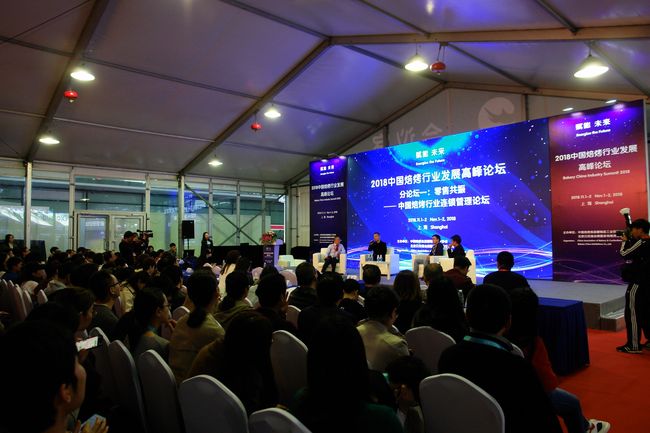China's first manless intelligent bakery outlet has proven a wise bet against escalating costs and in turning around a bakery chain's fortune, according to Huang Li (黄利), founder of Wedome (味多美), a Beijing-headquartered bakery chain.
Wedome opened its smart bakery outlet as part of an older traditional outlet in Chaoyang District of Beijing on 28 May this year, after more than a year's soul searching and preparation, at a time the 380-outlet bakery chain witnessed a rare decline in sales revenue on a monthly basis, said Huang in Shanghai in a major bakery exhibition today.
A customer picks his bread, cakes and snacks from shelves and cabinets, then puts them under a scanning machine, and then pays digitally. The outlet has so far attracted nearly 100 journalists who have produced 243 media reports that reached out to 55.805 million people, he noted.
He believed that the manless outlet, with Alibaba's support, has boosted his brand's awareness among the public, and thus enhanced its sales, adding "(company) sales rose 10 per cent and eight per cent respectively in August and September year-on-year."
His goal is to add the smart outlet into all his outlets, thus bringing down the 10-20 people needed to man an average outlet, to five, which should be two at the service area and three at the kitchen.
"My ultimate goal is to have each store to be manless," he said, speaking at a seminar today, the first day of a three-day bakery exhibition in Shanghai, "Bakery China Autumn 2018 & China Home Baking Show 2018".
During the first nine months of this year, Wedome's labour cost went up by 32 per cent on an annual basis, and its sales cost and rent up by 16 and seven per cent respectively, he said.
The average worker's monthly salary was RMB 4,500 last year, but this year it is RMB 5,600. The 22-year-old company has around 5,000 workers in Beijing, Shanghai, Baotou of Inner Mongolia and Sanhe of Hebei Province. "That means if we made RMB 60 million yuan in profit, the cost increase would wipe it out entirely this year," he added.
He explained that last year the company suffered an usually high labour turnover rate of 25.9 per cent so this year he decides to hire more workers than necessary to keep a reserve of some workers against that bad fortune.
In terms of sales cost increases of 16 percent, he said that this was mainly generated by the cost of food for sampling by customers. "This year we expended 200 per cent more on sampling food, as sampling has become ever more important in driving sales," he said.
He said that the catering business has a low entry barrier, "everyone believes they can run an outlet", but the result is, according to Meituan's data, in 2017 as many as 91.7 per cent of outlets of restaurant, cafes, bars and other forms of catering businesses newly opened sometime that year folded up at the year end.
Huang believes manless outlet can enable him to scale up quickly. "Luckin Coffee is manned by one to two people per outlet, so they can quickly launch 3,000 outlets across the country," he said.
Hai Di Lao, the hotpot chain listed in Hong Kong, opened a manless restaurant on 28 October. Huang thinks this is further testimony to the wisdom of his manless store strategy.
Sources say that Wedome's competitors, Bread Talk (面包新语), Qian Ji (仟吉) and Qin Yuan (沁园) have all plans to open manless outlets. ###
{高谈破论-上海快报} 11月1日电 - 拥有22年历史的味多美在京沪等地拥有近400家门店,今年5月业绩下滑,月底推出了酝酿一年多的智慧门店(这也是中国烘焙行业的首家智慧门店),截至目前吸引了近100家媒体记者前来试吃探访,发表300多篇文章,创造了5500多万人的阅读量。此举大力抬升了品牌知名度和美誉度,8和9月销售业绩分别同比增长10%和8%。董事长黄利今天在上海烘焙展表示,今后将大力推进智慧门店。本文首次发表于领英(https://www.linkedin.com/pulse/chinas-1st-manless-bakery-outlet-proves-wise-investment-sam-gao/)。
作者是高纲企业管理咨询(上海)事务所合伙人,汕头东峰消费品首席研究员、上海弘章资本食品与农业高级顾问、国际并购整合联盟(PMI)行业分析师,与多家FA机构和直投机构有着广泛深入的合作(包含股权架构设计、商业计划书写作指导和ICO中英文白皮书的写作等具体业务)。如希望参与行业研究讨论,或接触到FA机构推荐的精品项目,欢迎联系。



